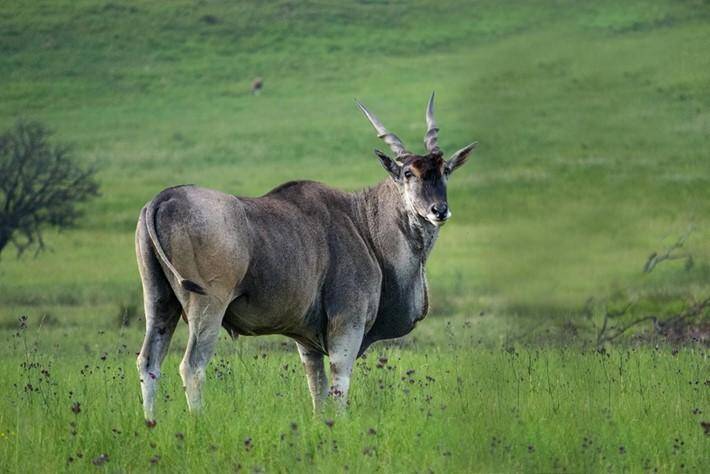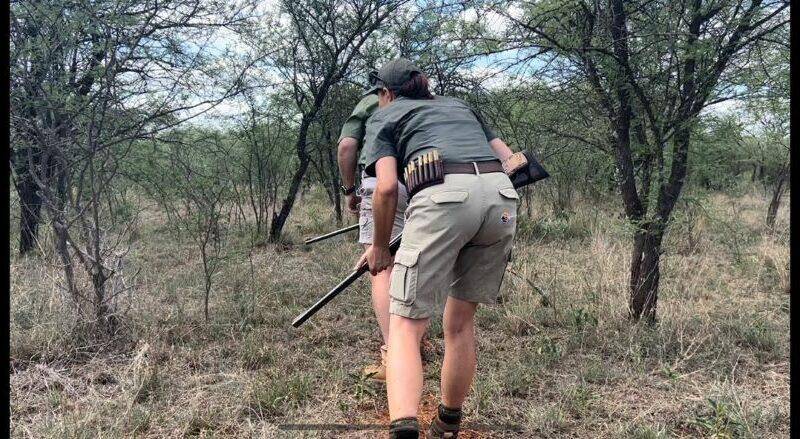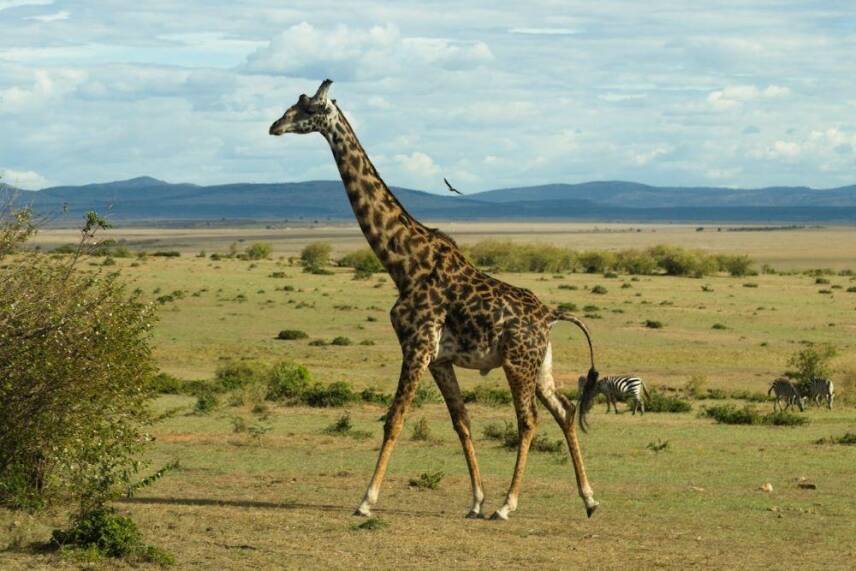This blog article is targeted at those starting hunting as a sporting activity or looking for further information regarding African hunts and hunting in Africa.
[DYNAMIC-BLOGTABLEOFCONTENT]
African Hunts: A Hunter's Bucket List Item
If you are thinking about going on an African hunting safari, get ready for an exciting and challenging hunting adventure! It calls for a unique set of skills and a good deal of knowledge. For an African hunting safari, South Africa is seen as the pinnacle destination, offering prime game hunting options year-round. To ensure that your African hunting trip is a real success, you will need to dive deep into the behaviors of the various species South Africa has to offer and become knowledgeable in different game hunting techniques.
Getting ready for a hunt involves more than just grabbing your gear. It is about getting to know your prey inside and out. Each animal has its own quirks and habits. For example, knowing where their habitat, their feeding patterns, as well as their sleeping and rest routines can up your game and increase your chances of a successful African hunting safari.
Remember that animals do learn, and should they be mercilessly targeted, they will become more wary to avoid becoming someone’s latest game hunting trophy. It is all about survival!
Different hunting methods have their perks, too. Stalking takes patience and a sharp eye, while tracking means following clues left by your prey. And if you are into hiding out, blinds can be your best friend.
Tailoring your approach to the specific game you are after is key. Bagging a big elephant calls for different tactics and gear than going after a nimble antelope. Knowing the right tools and tricks for different hunts can make a world of difference.
And it’s always good to remember the basics, such as staying downwind and moving quietly. It is all about blending in and outsmarting your target. With the right mix of know-how, practice, and planning, you will be ready to tackle any game hunting challenge that comes your way successfully and fully appreciative of the opportunity and the reward of hunting in Africa.

Game Hunting Methods: The Basics
Spot and Stalk
- This classic hunting method starts with spotting your target from a distance using binoculars or spotting scopes. Then, you sneak up quietly for a close shot. It is all about having sharp eyes, knowing which way the wind is blowing so you do not give away your scent, and finding good cover to hide in.
- For the best chance of success during your hunting safari in South Africa, try spot and stalk hunting during the early season, usually from March to mid-May.
- That is when the grass is still tall, and the bushes are thick and green, giving you plenty of cover to move around without being seen.
- But remember, conditions can vary, so it is always an innovative idea to check with local guides or experts for the most up-to-date advice.

Safari Hunting
- Picture this: You are on your African hunt cruising through the bush in a vehicle, glassing the horizon for signs of wildlife. Once you spot some game, the real hunting adventure begins! You might switch to sneaking up on your prey or setting up an ambush.
- This type of hunting is perfect for game hunting adventures that cover large areas of hunting grounds and encounter a variety of animals.
- With the mobility of a vehicle, you can explore remote areas and find hidden gems you might miss on foot.
- But before you head out, make sure you are up to speed on the local rules and regulations. Get the right permits, follow the hunting laws, and team up with experienced guides who know the lay of the land.
Tracking:
- Think of tracking in African hunting safaris like having a wise old friend who knows the bush like the back of their hand.
- These seasoned trackers are like nature detectives, following the clues left behind by various animals to lead you right to your chosen target.
- They are especially handy when it comes to hunting tricky customers such as the Cape buffalo and leopards.
- These animals are experts in disguise, but a good tracker can pick up on the subtlest signs – a bent twig here, a footprint there – and figure out exactly where they are headed.
- Tracking is not just about following footprints, though. It is a whole art form that combines knowledge of animal behavior, terrain, and even weather patterns.
- These trackers have spent years honing their skills, learning from the land, and passing down their wisdom from generation to generation.
Ambush Hunting
- Hunting in Africa requires infinite patience. Imagine yourself setting up your spot near a watering hole or a game trail, patiently waiting for the perfect moment when your prey comes into view. This method, known as ambush hunting, is like setting a trap for the game as they gather around scarce water sources during dry spells.
- During the dry season, animals rely heavily on these watering holes, making them predictable spots for a successful ambush.
- Similarly, game trails and feeding areas are prime locations to catch passing wildlife by surprise.
- To pull off a successful ambush, you need two key ingredients: patience and observation.
- You will need to stay still and silent for long stretches, keeping a keen eye out for any movement or sound that signals the approach of your prey.
- Ambush hunting offers a thrilling experience, allowing you to test your skills against the instincts of African wildlife. Just remember to respect nature and hunt responsibly, ensuring minimal disruption to the ecosystem and the animal’s natural behavior.
- With the right approach and mindset, ambush hunting can be an unforgettable hunting adventure in the heart of Africa.
Hunting from a Blind
- Another option to enjoy while on an African hunt is hunting from a blind.
- This involves setting up a blind where the hunter will sit and wait for the prey to get close enough to successfully target them.
- This is usually achieved by setting up the blind where game is known to frequent or pass, or alternatively, in the case of a predator, they can be lured closer by hanging bait to encourage them into the area.
Calling
- Imagine yourself out on an African hunt armed with nothing but the sound of your voice. This is a game hunting technique where you mimic the sounds of prey or distress to attract predators, such as lions and hyenas.
- While there are hunters that use their own voice to mimic calls, there are also predator callers available to assist in this hunting method.
- To succeed at calling, you need more than just a loud voice. You must know the sounds of the animals you are trying to lure and understand their behavior. Whether it is the plaintive cry of an injured animal or the gentle call of a potential meal, your ability to accurately replicate these sounds is crucial
- Calling can be a thrilling and effective hunting method, but it requires patience, skill, and a deep understanding of the natural world.
- By mastering the art of calling, you can immerse yourself in the primal rhythm of the African wilderness and experience the hunt in its purest form.
- There are many brands of predator callers available, with one of the most popular being the FOXPRO caller.
- Whether you master the art of calling naturally (which is a very impressive phenomenon!) or utilize modern technology, this game hunting method remains an exciting and challenging game hunting method.
General Tips to Improve Your Skills While Hunting in Africa
- Scouting: Pre-hunt scouting is essential. Use local guides and trackers who know the terrain and animal behavior. Trail cameras can also provide valuable insights.
- Practice: Regular practice with your weapon, whether a rifle or bow, ensures accuracy and confidence. Practice shooting from various positions and distances.
- Physical Fitness: African hunting can be physically demanding, involving long treks and challenging terrain. Staying fit enhances your stamina and ability to hunt effectively.
- Knowledge of Regulations: Be aware of local hunting laws, seasons, and licensing requirements. Respect conservation efforts and ethical hunting practices.
- Safety: Prioritize safety by following all firearm safety rules, being aware of your surroundings, and knowing how to react in case of encounters with dangerous game.
- Weather Awareness: African weather can be extreme, from hot to cold and everything in between! Understanding how different weather conditions affect an animal’s behavior can provide the edge in planning your hunt.
- Survival Skills: Basic survival skills, including navigation, first aid, and understanding the local environment, are essential, especially in remote areas.
- Shot Placement: Knowing the best way to effectively and efficiently target your prey will ensure a quick, humane death for the animal. Study your chosen prey and be well-equipped. Ethical hunting should remain at the forefront of all hunting activities. Learn more about shot placement on African animals.
- Practice Makes Perfect: Visit the shooting range and get in as much practise as you can as you prepare for an African game hunting adventure.
Recommended Reading and Resources
To delve deeper into hunting techniques and tips for African game, consider exploring a variety of resources to enrich, educate, and inspire your safari hunting trip.
Consider hunting books, magazines, or journals, and don’t forget the wide variety of online resources available at your fingertips. Check out hunting forums and websites, as well as podcasts and YouTube to gain better knowledge and understanding of African hunting safaris.
By studying these resources and continuously practicing and refining your skills, you can enhance your hunting techniques and increase your success while enjoying your African hunting adventure.
In Africa, understanding wildlife is a continuous learning process, as animals are constantly adapting to their environments. Learn more about African hunting safaris in a helpful blog entitled “The Beginner’s Guide to African Hunts and Hunting.”
Author: R. du Toit
